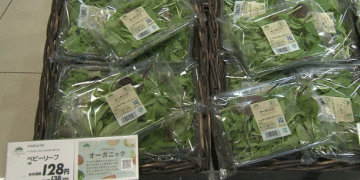Over the past few years, organic vegetables have become more accessible to consumers, particularly through major supermarket chains like Aeon, where the sale of organic produce has been steadily growing. In response to heightened demand, large agricultural corporations and new entrants to the field are making significant investments in organic farming. According to a report by NHK Mito Broadcasting Station, the growth in organic vegetable sales at Aeon has been robust, with annual increases of 10% over the past three years. The supermarket chain now stocks around 30 different organic items consistently, underscoring the broadening appeal and accessibility of these products.
One of the most popular organic vegetables at Aeon is “moyashi” (bean sprouts), reflecting a preference for fresh, easy-to-use produce. Baby leaf salads, often featured in ready-to-eat sections, have also seen strong sales. The rise of organic mushrooms, particularly shiitake, has been significant, with these items becoming more commonplace on supermarket shelves. The price point for organic vegetables has become increasingly competitive, with many items now only 30% more expensive than their conventional counterparts. This is a notable shift from a few years ago when organic products were often out of reach for many consumers due to their high cost.
The production side of organic agriculture has seen some innovative approaches to cost management. In Hitachiomiya City, Ibaraki Prefecture, large-scale agricultural corporations are adopting strategies to streamline production and reduce costs. For example, a local agricultural corporation led by Farm Manager Yokoyama is focusing on single-item production to optimize yield and cost-effectiveness. By producing large volumes of specific vegetables such as “komatsuna” (Japanese mustard spinach) and spinach in dedicated greenhouses, they have been able to meet supermarket demands efficiently while maintaining quality. These greenhouses, with a total of 61 units, produce between 3,000 and 4,000 bags of komatsuna per harvest cycle. The strategy of focusing on fewer, high-demand crops allows for economies of scale and more affordable pricing, making organic produce more accessible to the average consumer.
The spread of organic farming has traditionally been limited to forward-thinking farmers and health-conscious consumers, but with its increased visibility and more competitive pricing in mainstream supermarkets, organic agriculture is becoming a more viable option for the general public. This shift not only reduces environmental impact by lowering chemical use but also supports sustainability through better soil health and biodiversity. As consumers become more educated about the benefits of organic farming—such as reduced pesticide residues, healthier soil, and better nutritional content—there is a growing movement towards sustainable agricultural practices.
The expansion of organic farming in major supermarkets like Aeon is a testament to the growing consumer demand for sustainable and health-conscious food choices. The use of specialized production techniques and cost-effective strategies is helping make organic produce more affordable and accessible to a wider audience. This trend not only supports the agricultural sector’s shift towards sustainability but also promotes greater public awareness of the benefits of organic farming.































